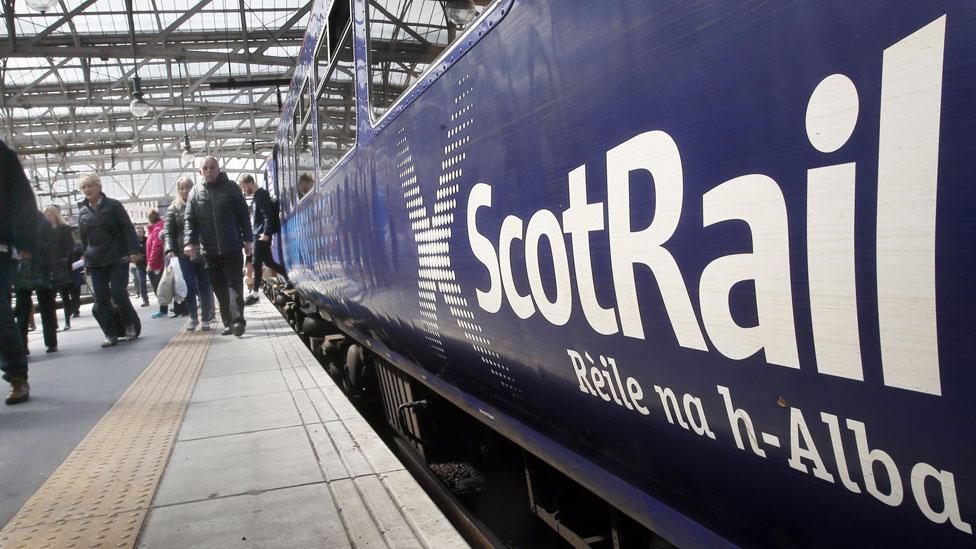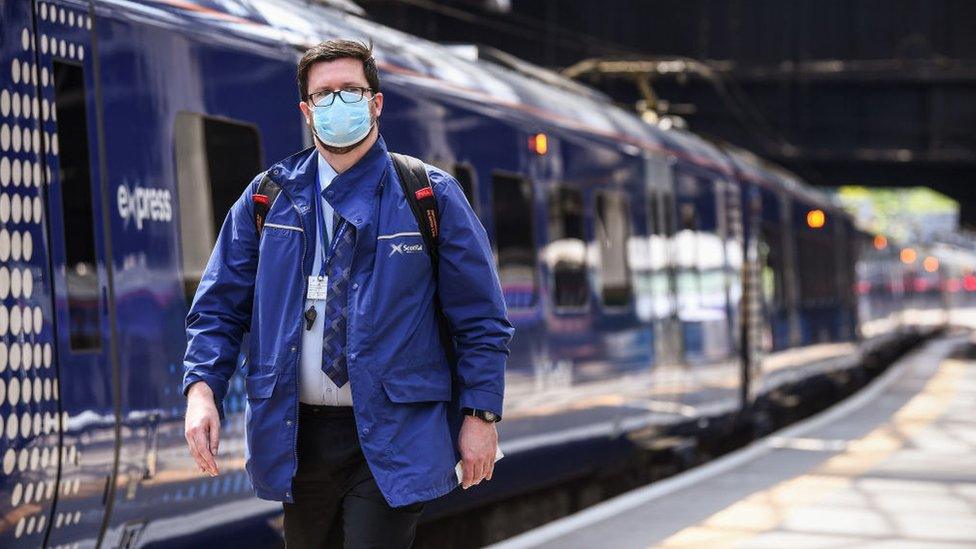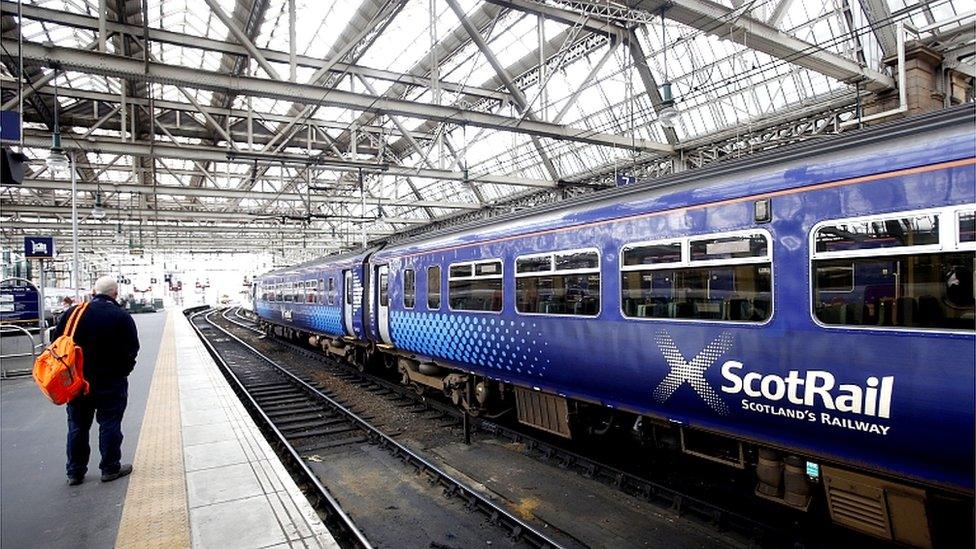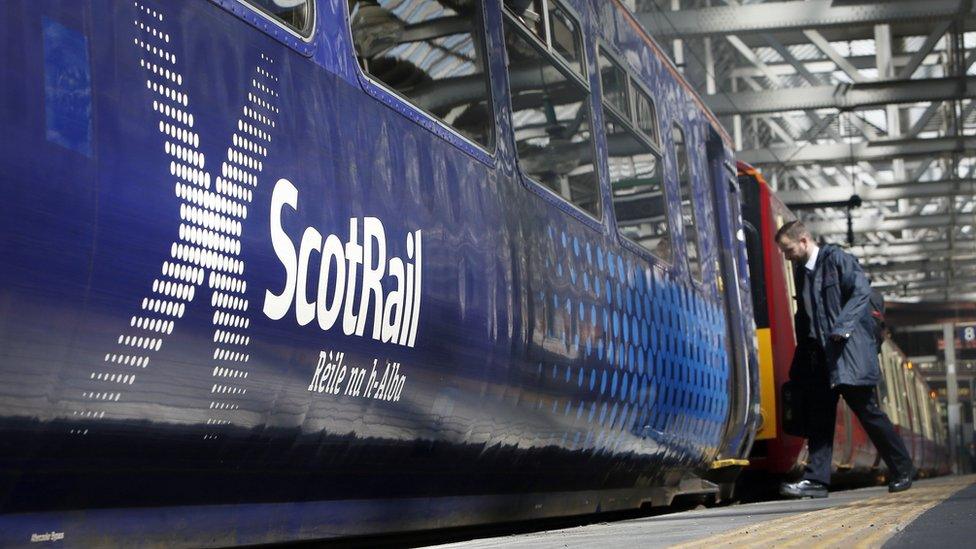ScotRail train driver shortage triggers wave of cancellations
- Published

Train services across Scotland continue to be affected by a shortage of drivers linked to an ongoing pay dispute.
About 300 services were cancelled on Sunday with dozens still disrupted on Monday as a new timetable was launched.
ScotRail, which was nationalised last month, has apologised to customers for the disruption.
Last weekend, a total of 110 services were affected. The union Aslef has now balloted its members for strike action after rejecting a 2.2% pay offer.
It said it had been left with no option and urged ScotRail and the Scottish government to get back round the negotiating table.
Kevin Lindsay, Scottish organiser for Aslef, told the BBC's Good Morning Scotland programme the problem would escalate if a settlement could be reached.
"When you take off the recent increase in National Insurance, 2.2% leaves us with around a £4 or £5 a week increase, when we are faced with increases in our council tax, fuel, electricity and spiralling food costs," he said.
"There is a cost-of-living crisis and there is no way Aslef members are going to sit back and take derisory offers, either from ScotRail or their bosses in the Scottish government."
Mr Lindsay said the union would give ScotRail formal notice of any strike action at the end of this month and - for legal reasons - announce the result of the ballot on 11 July.
"That gives ScotRail and the Scottish government plenty of time to return to the negotiating table in a fair and even manner," he added.
"The problem we have just now is ScotRail are trying to run a service on overtime. There's not a business in this land that is going to be successful where it has to be run on overtime."

The Scottish government took over ScotRail from Abellio on 1 April
Transport Minister Jenny Gilruth told BBC Radio Scotland's Sunday Show the shortages were causing "significant disruption" across the network.
David Simpson, ScotRail service delivery director, encouraged passengers to check their journey, external before travel.
He said: "We are experiencing a driver shortage, which means some services will be cancelled.
"We are very sorry for the disruption and inconvenience this will cause and understand customer frustration when this happens.
"Unfortunately, since the drivers' union Aslef announced it would ballot for strike action, a significant number of drivers, but not all, have declined to make themselves available for overtime or rest day working."
Mr Simpson acknowledged rest day working is "entirely voluntary" but he added it means the operator does not have enough drivers to run a full timetable.
He added: "We are currently reliant on drivers working overtime or on their rest days because of delays to training new drivers caused by the pandemic.
"This is something experienced by all operators across Britain."
'Running out of steam'
On the issue of pay, Mr Simpson said ScotRail's offer could be worth 7%, based on a 2.2% pay rise and a top-up revenue sharing arrangement.
It is understood this would apply where revenue targets are exceeded.
Ms Gilruth described the practice of rest day working as "outdated" and said the Scottish government was looking to phase it out.
She also said ScotRail would not have to rely on it when the delayed driver training has been completed but this was expected to take a few months.
Ms Gilruth told BBC Radio Scotland's The Sunday Show: "We want ultimately our rail unions to have a vested interest, a stake, in the vision of the new ScotRail and what that looks like, what that means for them and their members and the staff who work on our trains. I think that is hugely important.
"At the moment rest day working continues to be needed. We are looking to phase out that practice."
She also told the programme the new timetable would see about 150 additional services added compared to the current timetable but stressed services were not at the same level as they were before Covid.
Scottish Labour's transport spokesman Neil Bibby said Ms Gilruth's BBC interview provided "no answers and no update".
He added: "Rail services are being cancelled daily, drivers on strike and fares escalating.
"This was an opportunity for the minister to give Scots reassurances but instead showed a minister, and a government, running out of steam."
ScotRail went back into public ownership in April for the first time in 25 years. The previous operator, Abellio, had its franchise ended early amid criticism of the quality of the service.
- Published12 May 2022

- Published1 April 2022

- Published9 February 2022
